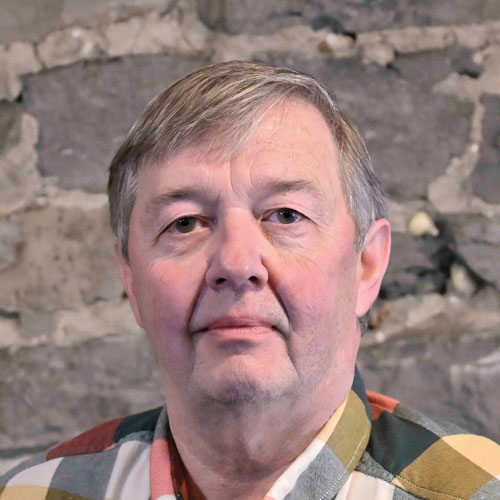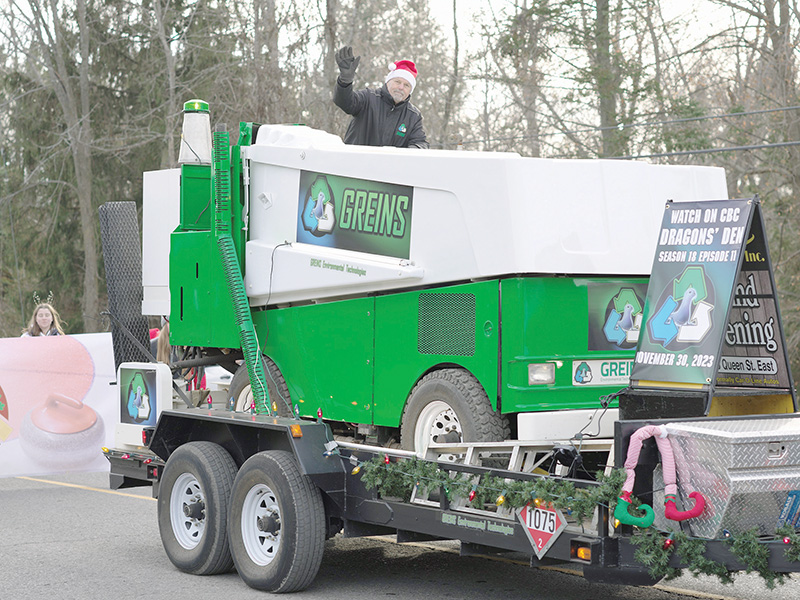Not only was the GREINS modified ice resurfacer featured on Dragons’ Den, it also made an appearance at both the Russell and Embrun Santa Claus Parades. It’s always good to remember where you come from. Tinkess Photo
Isn’t it funny how often, the very best ideas seem so obvious, but only after someone else has thought of them? That is very much the case with GREINS Environmental Technologies which provides an environmentally sustainable method of maintaining artificial ice surfaces.
If you have ever sat in an arena watching hockey or figure skating, you have no doubt watched the ice resurfacing machine making its rounds, scraping off the loose ice and snow and leaving a clean smooth surface. You have also probably seen the mountains of snow that are dumped outside following each resurfacing. What you probably haven’t considered is exactly how much water and energy is used in maintaining that clean, smooth surface. One person did though, and that person is Ron Albert.
Albert has spent a large part of his life in hockey arenas, some of it as a semi-pro hockey coach, but it was the more than 30 years of experience as a facility operator, including time spent working with the City of Ottawa and their ice resurfacing equipment, that allowed him to see things differently. As a result of his astute observations, in 2012 he formed GREINS Environmental Technologies, with the goal of developing an environmentally friendly and economical solution for ice resurfacing machines.
In business there is rarely anything that can be honestly referred to as an “overnight success,” and Albert and his invention are no exception. While he may have seriously thought of developing his idea in 2012, it wasn’t until 2014 that a prototype was developed, and it needed work. In 2017 he was able to get the support of the National Research Council (NRC) and gain access to local rinks to field test his ideas. By 2018 people were starting to notice him, but it was the potential for massive savings that really got their attention.
“My dad was a machinist by trade and I always worked on engines and a bunch of stuff since I was a kid,” said Albert. “And my dad always taught me you never say no, don’t let anybody tell you that it can’t be done, there’s always a way to do it.”
Albert didn’t want to bring his idea to market until he was confident that he “had it right”. Still, momentum continued to grow, reaching a pinnacle on November 30, 2023, when he made an appearance on CBC’s Dragons’ Den. What he told the Dragons really got their attention.
Consider these numbers: It takes approximately 700 litres of water per flood (ice resurfacing). On a two-pad arena there would be 16 floods per day. Over 12 months that would be 8,064,000 litres of water saved, or $24,192 based on the estimated national utility average cost per cubic metre of water. That’s a lot of money, but it is also a lot of water being saved.
You also eliminate the need to preheat water, something that is required with traditional technology. If you take those same 16 floods of 700 litres times $0.15 cents per kWh times 40 kWh (the amount of electricity required to heat 60-degree Celsius tap water to the 140 degrees Celsius needed) you have an estimated yearly hot water cost savings of $69,120.
There are also added benefits, such as no costly snow removal expenses, reduced safety risks because the resurfacer doesn’t need to leave the arena and enter public spaces, and reduced heat loss from frequent opening and closing of the bay doors.
The cost of retrofitting a traditional ice resurfacer, an Olympia or a Zamboni for example, is about $150,000, but GREINS would then lease it to an end user for much less than they would have paid to purchase one. Combine that with the cost savings and it makes an even more attractive option.
Albert and his team had gone into the Dragons’ Den looking for $500,000 for 25 per cent of the company as well as a $3 million line of credit. They had two offers and accepted a deal that gave them what they asked for, but for 49 per cent of the company if they could obtain five letters of intent. They gave up more than they wanted to, but maintained controlling interest which is a very important part of any business deal.
As anyone who has watched Dragons’ Den knows, a lot of work still has to be done after the episode is filmed. “It’s getting good,” said Albert. “We’re still in the due diligence stage but we’ll be getting another meeting going. And then next week, by the end of the month, we’re hoping to have something a little more concrete as to what’s going on.”
For Albert, though, it’s more than just business. “Every business is in this to make money but with me it’s more to be able to save the water, the environment that we need, and get kids back into playing hockey,” he said. “I coached junior hockey, junior “B” hockey, for years. And kids should have the ability to use our facilities and at a reasonable price. Things are just out of control right now. Maybe this will help.”
Ron Albert and his team seem to be on the road to success. They own the North American patents for the technology and are working on Europe, their initial production run is underway, and they have limited the first group of allocations to 24. Their story shows that even coming from a small eastern Ontario town like Russell, if you’re willing to work hard and not give up on your dream, you can get there. You just have to look at things a little differently.
If you would like to have a light shined on your business, please contact us at: editor@etceterapublications.ca or call us at 613-448-2321.

Terry Tinkess is a professional photographer, educator and journalist. He has been making a living with a camera and keyboard since 1999 and has been featured in such publications as The Ottawa Citizen, Cornwall Standard Freeholder, The Globe and Mail, The Miami Herald, Ottawa Construction News, The Ontario Construction Report, Ontario Home Builder Magazine, Reed Construction Data, Canadian Potato Business and most recently, The Record and Eastern Ontario AgriNews. Terry lives in Ingleside, Ontario with his wife Brenda, Mia the anxious Pittie and cats Wally and Chubbers.











